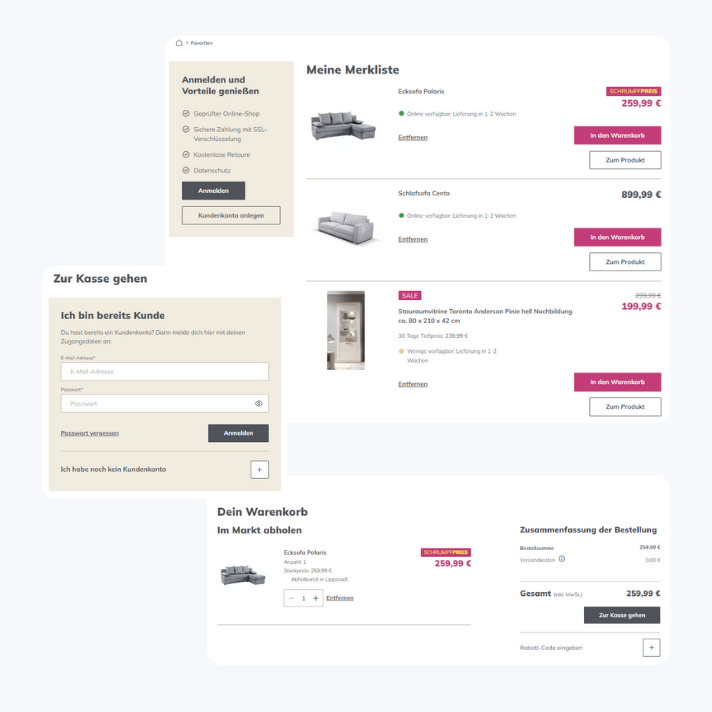- Home
-
Case Studies
-
E-Commerce
Möbel Boss Case Study

.png?width=1030&name=mb%20(1).png)
eCommerce + SAP composble storefront
How migration from SAP Hybris Accelerator to SAP composable storefront helped improve the Lighthouse score of Möbel Boss
Porta Möbel, owner of Möbel Boss, is one of the largest furniture and decoration companies in Germany. The company has a couple of subsidiary companies, the majority of which sell furniture and home décor products.
The goal of our cooperation was to improve efficiency and change the architecture of their eCommerce platform. As the owners of a platform with a SAP Commerce Cloud back end, they were looking for the best front-end solution for their needs, and SAP composable storefront (previously SAP Spartacus) answered all of them and enabled us to improve the store's results.
Technology
SAP composable storefront
Scope
Migration
Development
Optimization
Vertical
Home & Décor
01
Why were we asked to help?

Porta Möbel, founded in 1965, is one of Germany's largest family-owned furniture house chains with an annual turnover of over €1.3 billion.
The Porta Group employs 7,000 people in total. In addition to its headquarters in Porta Westfalica, the company operates 29 Porta furniture stores, about 100 Möbel Boss stores, and four logistics centers in Germany as well as 22 ASKO Group furniture stores in the Czech Republic and Slovakia. Möbel Boss began expanding into former East Germany in 1990, impressing the people with its furniture expertise.
To meet customer needs, Möbel Boss opened its eCommerce platform in 2011. In order to keep up with the constantly changing market and optimize its online store, Boss Möbel turned to us to transfer it from Accelerator technology to SAP composable storefront.
Boss Möbel approached Cloudflight because they needed a trusted partner to help with the migration. They also needed support in fixing major and minor bugs as well as project-wide cleanup of unwanted libraries and solutions.
02
How did we tackle the tech?
Defining the challenges
After using SAP Hybris for a few years, Möbel Boss was ready for the next steps in their eCommerce platform development. After they reached out to Cloudflight (formerly Divante), we set the key project goals during a deep analysis and created an interdisciplinary team. The team consisted of over 14 people, including four experts from Cloudflight and nine developers on Möbel Boss’s side.
Architecture building
The initial architecture was proposed and implemented by an in-house team, but after joining forces, both sides decided to make some changes to it. Our main objective was to improve the performance of Möbel Boss's Spartacus and fix major memory leaks. Other than that, Cloudflight was involved in correcting some bugs, both major and minor, across the whole application. After we joined the team, we also made some substantial changes to the architecture and the overall idea of how Spartacus was implemented on the platform. Our cooperation resulted in the implementation of new features and a better quality of source code: we used our own code style to improve work and cooperation on both sides.
Development
Before the cooperation started, the client started implementing the back-end layer. After that, they began with the implementation of the first parts of Spartacus into their environment. Cloudflight was at first involved in Spartacus preparations and initial implementations of the front-end layer. After completing the installation phase and determining the next steps needed to build a functional eCommerce platform, Möbel Boss decided to use the potential of its internal team and work in close co-creation with Cloudflight to finish the work started together. The main goals were to improve the performance of Spartacus and memory issues.
03
What did we achieve?
First, we managed to fix major and minor bugs to improve the Lighthouse score.
We observed a significant improvement in performance, memory leaks were mostly conquered, and a lot of new features were added by the team. We were also able to perform a project-wide cleanup of unwanted libraries and solutions on the platform.
Our cooperation is mutually beneficial: Möbel Boss got high-quality code and many ideas from experienced developers. On our side, we were able to work in a very relaxed and understanding environment where we could write tests and propose our own solutions to solve issues while maintaining a great deal of trust on the client’s side.
Need help in digital transformation?
We’d love to hear about your project. Our team will get back to you as soon as possible.

Divante 2024




